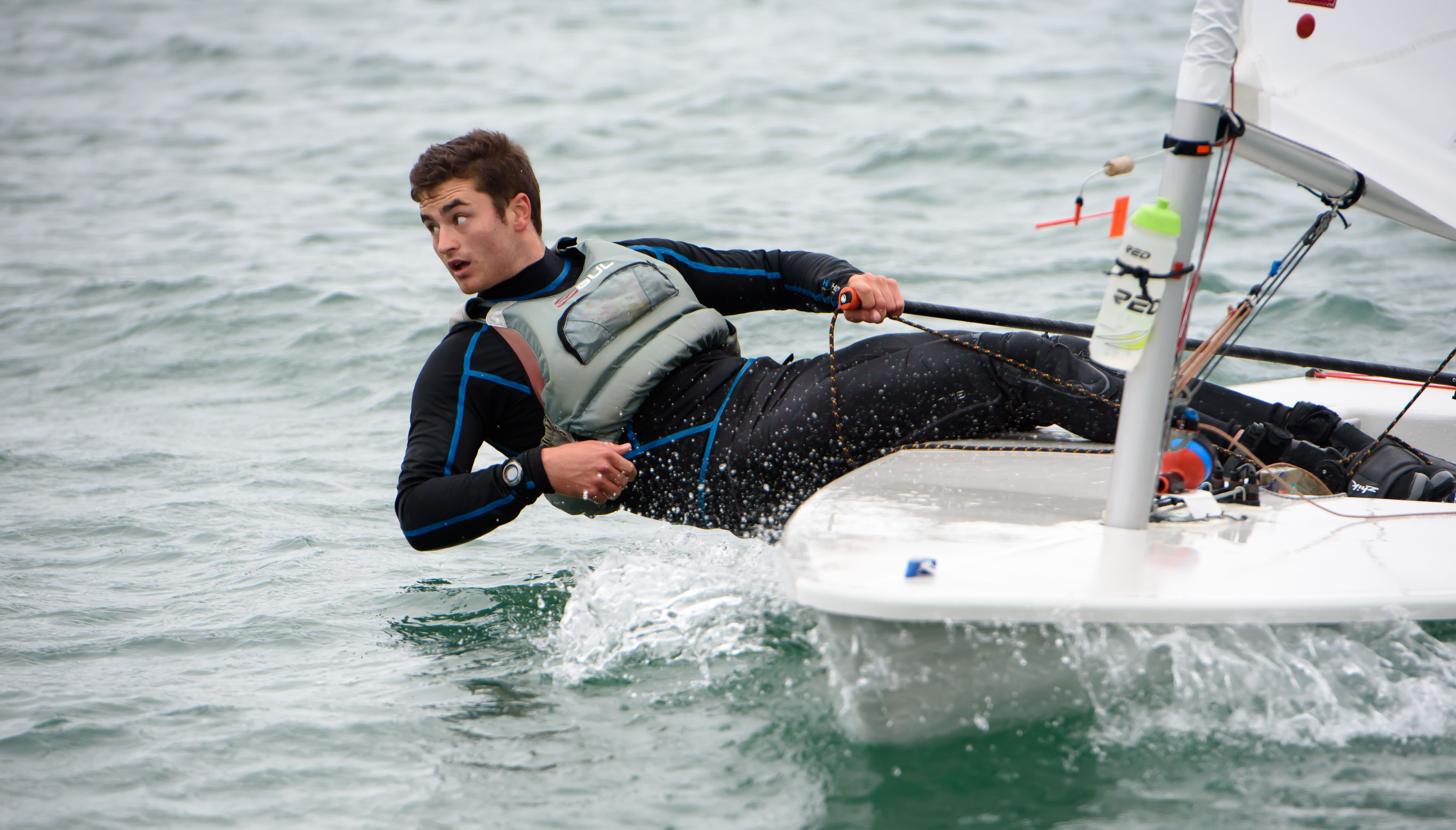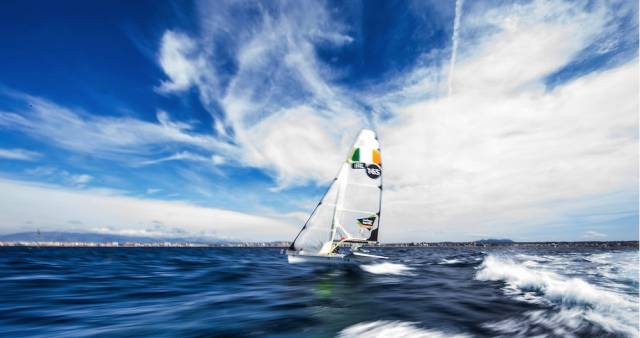None of the Irish contenders for the mens Laser berth slot have made the gold fleet cut today at the important Trofeo Princesa Sofia Regatta in Palma. The result, however disappointing in the build up to Rio, intensifies the three way Irish Olympic test underway in Palma Bay where there has been a change in the trials lead.
If day one of the regatta yesterday proved a straighforward boatspeed day in moderately brisk breezes, Tuesday's races today were much more about being in the right place, in the best pressure as much as possible. 800 boats are competing and 13 Irish sailors are in Palma but the Irish mens Laser trial is the focus of attention. The three contenders, from Dublin, Cork and Belfast, remain neck and neck.
Finn Lynch, the young National Yacht Club sailor who has made no secret of his cash–strapped campaign has emerged as the leading Irish boat overall after a lighter winds this afternoon. Lynch had a fifth in the opening race followed by a 23rd to leave him 52nd overall in the 152-strong fleet. Just two points stood between him and the cut for the Gold fleet that starts racing tomorrow.
Now in the Silver fleet, Lynch will keep a keen eye on Northern Ireland's James Espey who had a 20th and a 22nd yesterday and he dropped to 62nd overall, crucially five points behind Lynch. A 13th yesterday for Fionn Lyden of Baltimore was enough to get him into the Silver fleet so it is still anyone's guess who will be Ireland's rep in Rio, a race that looks set to go right down to the wire. The third and final selection trial is in Mexico in May.
Finn Lynch campaign video
Northern Ireland 49er Loses Overall Lead
In the 49er Skiff, although Ryan Seaton and Matt McGovern have lost their overall lead from day one they are joint second. A second and a third keep the Belfast pair on course for Saturday’s medal race final.
It was a different story unfortunately, for Rio qualified Andrea Brewster and Saskia Tidey in the 49erFX skiff. After a consistent top ten opening day, the Dun Laoghaire pair had a more challenging day and results in the 20s leave them in 15th overal from 27.

Darragh O’Sullivan Photo: Bob Bateman
Other Irish boats competing amongst the 800–plus fleet on the Bay of Palma, Kinsale's Daragh O’Sullivan is racing in the Laser Standard class and lies 117th overall.
In the 49er class, Robert Dickson and Seán Waddilove completed all three races yesterday in their debut at Palma and are 63rd overall. Mark Hassett and Oisin O Driscoll are close behind in 65th place.
Finn sailor Oisin McClelland from Donaghdee in County Down is racing in the Finn single-handed dinghy and lies 39th overall in his 74-boat class.
The result table toppers in the Men's 470 and the Laser Radial classes both count all first places - though both Olympic medallists Mat Belcher, and crew Will Ryan of Australia and Evi Van Acker discard their one bigger score, albeit a third and sixth respectively.
New Zealand's singlehanders are showing well so far. Josh Junior and Andrew Maloney now lead the Finn and Laser classes respectively after today and Sarah Winter, counting 2,2,7 to date, is fourth in the Laser Radials.
In the Laser Men's fleet Andy Maloney leads Norway's Kristian Ruth and the USA's Charlie Buckingham. Ruth is part of a strong Norwegian squad who have trained this winter on the Bay of Cadiz with 1996 Olympian Anton Garrote.
Despite the short postponement this morning the regatta schedule is pretty much on course. Three races were sailed for the 49ers, RS:X and Nacra 17s while the other classes completed two.
470
1. Mathew Belcher/ Will Rya, AUS, 3 points
2. Stu Mcnay/Dave Hughes, USA, 5
3. Anton Dahlberg/ Fredik Bergstrom, SWE, 6
470 Women
1. Amy Seabright/Anna Carpenter, GBR, 4
2. Fernanda Oliveira/Ana Barbachan, BRA, 4
3. Annika Bochmann/Marlene Steinherr, GER, 8
49er
1. Nico Delle/Nikolaus Resch, AUT, 11
2. Diego Botín/Iago Lopez, ESP, 14
3. Ryan Seaton/Matt Mcgovern, IRL, 14
49 FX
1. Jena Mai Hansen/Katja Steen, DEN,10
2. Annemiek Bekkering/Annerre Duetz, NED, 16
3. Martine Grael/Kahena Kunze, BRA, 17
Finn
1. Josh Junior, NZL, 9
2. Giles Scott, GBR, 15
3. Pieterjan Postma, NED, 15
Laser
1. Andrew Maloney, NZL, 5
2. Kristian Ruth, NOR, 7
3. Charlie Buckingham, USA, 8
Laser Radial
1. Evi Van Acker, BEL, 3
2. Alison Young, GBR, 8
3. Tuula Tenkanen, FIN, 10
NACRA
1. Billy Besson/Marie Riou, FRA, 11
2. Paul Kohlhoff/Carolina Werner, GER, 25
3. Thomas Zajac/Tanja Frank, AUT, 26
RS: X Men
1. Tom Squires, GBR, 4
2. Vyron Kokkakanis, GER, 5
3. Andreas Cariolou, CYP, 8
RS:X Women
1. Olga Maslivets, RUS, 4
2. Lilian De Geus, ISR, 7
3. Charline Picon, FRA, 7





























































